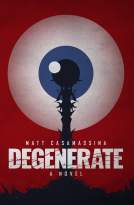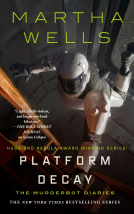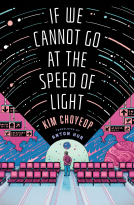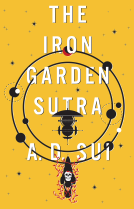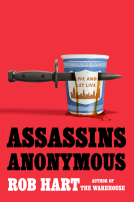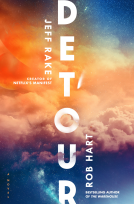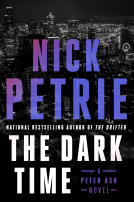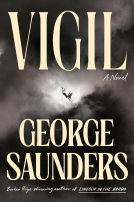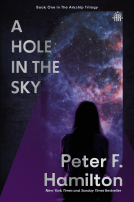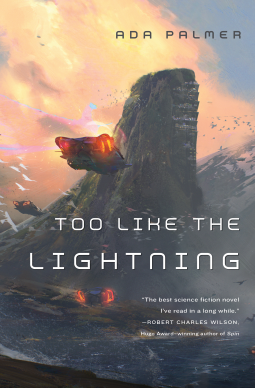
Too Like the Lightning
Book One of Terra Ignota
by Ada Palmer
This title was previously available on NetGalley and is now archived.
Send NetGalley books directly to your Kindle or Kindle app
1
To read on a Kindle or Kindle app, please add kindle@netgalley.com as an approved email address to receive files in your Amazon account. Click here for step-by-step instructions.
2
Also find your Kindle email address within your Amazon account, and enter it here.
Pub Date May 10 2016 | Archive Date Oct 01 2021
Macmillan-Tor/Forge | Tor Books
Description
From the winner of the 2017 John W. Campbell Award for Best New Writer, Ada Palmer's 2017 Compton Crook Award-winning political science fiction, Too Like the Lightning, ventures into a human future of extraordinary originality
Mycroft Canner is a convict. For his crimes he is required, as is the custom of the 25th century, to wander the world being as useful as he can to all he meets. Carlyle Foster is a sensayer--a spiritual counselor in a world that has outlawed the public practice of religion, but which also knows that the inner lives of humans cannot be wished away.
The world into which Mycroft and Carlyle have been born is as strange to our 21st-century eyes as ours would be to a native of the 1500s. It is a hard-won utopia built on technologically-generated abundance, and also on complex and mandatory systems of labelling all public writing and speech. What seem to us normal gender distinctions are now distinctly taboo in most social situations. And most of the world's population is affiliated with globe-girdling clans of the like-minded, whose endless economic and cultural competition is carefully managed by central planners of inestimable subtlety. To us it seems like a mad combination of heaven and hell. To them, it seems like normal life.
And in this world, Mycroft and Carlyle have stumbled on the wild card that may destabilize the system: the boy Bridger, who can effortlessly make his wishes come true. Who can, it would seem, bring inanimate objects to life...
Available Editions
| EDITION | Other Format |
| ISBN | 9780765378002 |
| PRICE | $26.99 (USD) |
Average rating from 37 members
Featured Reviews
 Rachel S, Reviewer
Rachel S, Reviewer
I think the publisher’s description expresses the opening of this story very well – and the rest becomes increasingly intricate with every chapter, every new character, and every sly reveal. I really do not want to give too much away!
This is a story with many threads that will take time to untangle. If I had to summarize Too Like the Lightning, I would say I understood it as a tale about how sudden forces and plots begin to destabilize a utopia-like political system. It’s philosophical, intellectual, political – like a love letter to ancient philosophy and the Enlightenment, transported to the 25th century, in a bizarre but fantastic way.
Mycroft Canner (one of the direst criminals in this world now serving out his sentence in public servitude) is tasked to write this history of seven days in which the world’s political system of non-geographical Hives (or “party-nations”?) slides towards collapse. Mycroft narrates parts that he is present for, as well as situations where he is not physically in attendance, but hearing what is going on through other people’s trackers. In a few interludes, another character investigating one of the mysteries, Martin Guildbreaker, is asked to insert their own interviews with others where Mycroft was not present.
Interestingly, the “Reader” speaks back to Mycroft in the familiar form, countering his statements or actions or the fashion in which he tells the story – such as alluding to characters’ gender, either biological or in the way that Mycroft wants to “code” them for the Reader. At one point, Mycroft even “debates” with the Reader about who the protagonist of the book is! You’d conclude perhaps that it’s Mycroft, because he is narrator and actor, but he assures us that it is the child Bridger with the supernatural power whom we should be watching:
“I am the window through which you watch the coming storm. He is the lightning.”
One of the most deliciously convoluted aspects of this world is the gender politics and how Mycroft slides back and forth between the socially acceptable neutral “they”, the real biological sex of characters, and “his” own choices for coding people’s gender depending on how he wants to present them. It is not socially acceptable in this futuristic world to display gendered traits, such as clothing. Everyone dresses in “wraps”, hiding their physical biological characteristics as much as possible. To outright “gender” a person with pronouns is shocking and taboo. But Mycroft shifts around all the time and shows us that even in a world where gender isn't supposed to matter anymore... people still seem to care.
The pronouns used to refer to any one character can range across all possibilities in a single scene, from the preferred “they”, to “he”, to “she”! It was dizzying and torturous to figure out and exhilarating, as I felt at times that I was truly reading about characters whose gender didn’t matter or where everything was so topsy-turvy that you simply could not make assumptions.
Too Like the Lightning began very slowly. It is, as Ada Palmer has stated, “written in the style of an Eighteenth-Century memoir or philosophical novel, like Candide.” This style was hard to adjust to and slowed down my reading through the first half of the book. However, my appreciation for the depth of the world, the unreliability of the characters and narrator, and the mature depiction of incestuous world-level politics grew dramatically throughout. This story and its telling are unique and don’t fit into any mold I’ve read before.
There were moments where I thought the novel had become weird, or heavy, or too dry – and then suddenly cool in the most nerdy of ways. There is an entire chapter where all the dialogue is in Latin! No, not just the translation because you’re told the scene is Latin, but the actual Latin is on the page, with the translation interspersed. The fourteen-year-old in me (who was obsessed with the idea of writing stories with translated dialogue) went nuts over that.
People who love philosophy, historical fiction (particularly ancient Greece, Rome, and the Enlightenment), political intrigue, and science fiction will all find something to enjoy in this novel. By the end, all I wanted was the next book and more, more, more!
 Stephenie S, Reviewer
Stephenie S, Reviewer
I have never before encountered a novel quite like Too Like the Lightning. It is a must read for any student of philosophy, particularly those who enjoy speculative fiction. Too Like the Lightning is not your run of the mill scifi novel. Although there is action, much of the novel involves the complexities of politics and conflicts of a philosophical nature. Parts read more like a political thriller than the average scifi novel.
The world of Mycroft Canner is vastly different from our own. It is a utopia, albeit far from perfect. Countries as they are today no longer exist. After the numerous wars caused by religion, religious practice is outlawed, while individuals are encouraged to develop their own system of belief. The world is post-gender, with every individual male and female referred to as them and they in order to perfect equality. Sensayers play the role of psychologists and priests, counseling individuals on spiritual and philosophical matters. Members of similar ideologies live together much like members of a clan or extended family. War and conflict are meticulously avoided through political and social maneuvering. While alien to our own modern sensibilities, the system works.
There are two things that drastically upset the status quo. First, there is Bridger, a young boy with the inexplicable ability to bring toys and other inanimate objects to life. Mycroft, amidst his other duties, struggles to hide and protect Bridger. Second, a stolen document appears in the Saneer-Weeksbooth bash’, drawing unwanted attention to the bash, endangering Bridger. The document itself is of minor importance, but the political ramifications of the theft are many, particularly since the Saneer-Weeksbooth bash’ is responsible for the worldwide transport system. The ability to travel effortlessly and speedily from one side of the world to another is essential to the stability of their social and governmental system.
Readers with a background in philosophy will enjoy seeing how the ideas of various philosophers such as Diderot and Voltaire are implemented, and examining the questions that arise. The novel is thought provoking in the extreme, although rather dense at times. While Too Like the Lightning is an excellent book, it is not a good choice if you are looking for a quick, light read. The only disappointment I had is that the novel ends about midway through the tale. I can understand that because otherwise the novel would be impossibly long. It’s already 432 pages in print form. Needless to say, I am anxious to read the continuation - Seven Surrenders.
5/5
I received a copy of Too Like the Lightning from the publisher and netgalley.com in exchange for an honest review.
—Crittermom
(5/13/16)
 Annie S, Librarian
Annie S, Librarian
In every presidential election I’ve been eligible to vote in, there is a running sort-of joke that, if the other guys wins, voters will move to Canada. The implication is that, if the other guy wins, things will be so messed up in this country that it isn’t even worth sticking around for the next election cycle. In Ada Palmer’s Too Like the Lightning (the first half of a longer novel published in two parts), the world’s population has voted with their feet. In the 2400s, the world is governed by Hives. The legal, criminal, educational, and religious systems are regulated by the best ideas the world’s philosophers have come up with since the days of the Roman Empire. The world is not perfect by any means, but it might be as close to utopia as humans can ever get—at least it would be if the whole thing weren’t teetering on the edge of global war.
Our narrator is the notorious Mycroft Canner. We don’t know until much later why Mycroft is so notorious. All we know is that he committed a serious crime and is now serving community service for the rest of his life. In addition to manual labor, Mycroft serves the world’s leaders as a translator and troubleshooter. He is also the secret guardian to a boy named Bridger, who can work miracles. This is where we meet Mycroft, after a short introduction in which he tries to tell us a bit about his world and its rules. Too Like the Lightning has a long learning curve, but I very much enjoyed the philosophical discursions and history lessons.
There is too much plot in this 400+ page book to summarize in any kind of depth. Besides, it’s the first half of a much longer novel. The rest will be published this fall. Still, I’ll take a stab. After meeting Mycroft, Bridger, and seeing a bit of their home place, Mycroft is called in to help investigate a theft and a frame up. The theft is just the tip of the iceberg in a global conspiracy. Every chapter in this book deepens the mystery and kept me guessing about who was really behind it all.
On top of the plot, I was completely hooked on the worldbuilding in Too Like the Lightning. At times, the book felt like what YA dystopias only dream of being. The people who set up Mycroft’s society really did comb through centuries of philosophy, psychology, and legal texts to cobble together something like a utopia. After borrowing from Voltaire, Carlyle, Diderot, the Romans, and other thinkers, the founders offered people floating citizenships. Citizens could join up with nations that most closely aligned with their values and tolerances for liberty-limiting laws. The founders did everything they could to create a system that would ensure that there would no longer be huge disparities between haves and have-nots.
There are two problems with striving for utopia is that the ideals of the society must always fight against the inherently self-interested nature of human beings. There will always be people who want more. Hence the mysteries and conspiracies and assassinations and subterfuges. The other problem with seeking utopia is simple change. The world is a complicated, chaotic system. Something will eventually come along to throw everything out of whack. Neither of these problems has dissuaded our species trying, however, and it sure is fun to watch people take a stab at perfection.
I received a free copy of this book from NetGalley for review consideration. It will be released 10 May 2016.
 Brad H, Reviewer
Brad H, Reviewer
Too Like the Lightning by Ada Palmer My rating: 5 of 5 stars
Beautiful, Beautiful, Beautiful, Beautiful.
First impressions are very deceiving, with this one, and assumptions can get you into a huge mess of problems, but fortunately for us, this writer has some serious chops, can lead us into a world that never quite changes, from the first page to the last, but instead invites and sometimes pushes us over the edge and CHANGES US.
What is this world, where are we headed? Is this truly a futuristic high-tech utopia that stylizes itself off the Enlightenment period including Voltaire, Sade, and Rousseau? Ha! You'd like to think so as you begin your read.
Is the tale revolving around a handful of seemingly mild mysteries, that while interesting in themselves, seem more like a vehicle for unfolding one of the most gorgeous societal world-building tableaus I've ever had the privilege to read? Ha! ... Again, I was fooled, lulled into complacency even as I was overwhelmed with sheer walls of world-data, only to be saved, regularly, by the sure hand of a truly wonderful and insightful narrator who would steer us through the dense currents and land us safely upon solid ground. Could I have wished for a more perfect or more gentlemanly Victorian Guide in a strange land? Nope!
And then there were the conversations. This novel has a lot to say about gender roles, and it is tackled delightfully, maybe even better than Ancillary Justice for sheer oddity. Social and societal quirks surrounding religion, was a big part of the novel, too, but it was the Conversation that made this novel become something Really Special.
And I really mean the Conversation; the ongoing discussion within whole fields of study and art and literature, or in this case, philosophy and science fiction. Ada Palmer deserves to be right up there with some of the best I've read, having so much to say about the Enlightenment period, made into a deep part of the story, aspects of the world-building, discussions both light and powerful between characters and even within our narrator's mind.
Some of the most awesome aspects of this novel are direct-line continuations of philosophy made into Art.
But do not let that dissuade you from this Oh So Excellent and Fascinating read, for even as I was fooled in the beginning, and as new and otherwise unforgivable glossed facts are slowly revealed to us, we are caught in a web much more complicated, dangerous, harrowing, bloody, and frankly more awe-inducing than I would have guessed in the first 150 pages.
It's a book worth reading several times over if only to pick up on all the clues that I had registered in passing, but not understood until much later.
And I will, because here's the real beauty... it's only part one of a two book cycle that belongs to one another. You know the symptoms. This is a fantastic larger tale that, by requirements out of the author's control, needed to be split unnaturally into two. It's only something truly miraculous and fantastic that the author still managed to make this single book feel complete and satisfying, even as it points to the second half of it's soul.
I feel truly blessed to be reading this. Ada Palmer has just earned herself a lifelong fanboy after a single wonderful read. This is what true Idea SF is all about, and it deserves to be up there with the very best. Remember Anathem? Sit yourself down for some real brilliance and some truly great set-sets.
I'm sure I won't be the only one who thinks the premise of the political setup is one I'd love to have now, even with its mature problems. I think this novel is going to be prompting an absolute TON of discussion among its soon-to-be legion fans. :) If there's any justice in the world, mind you. :)

